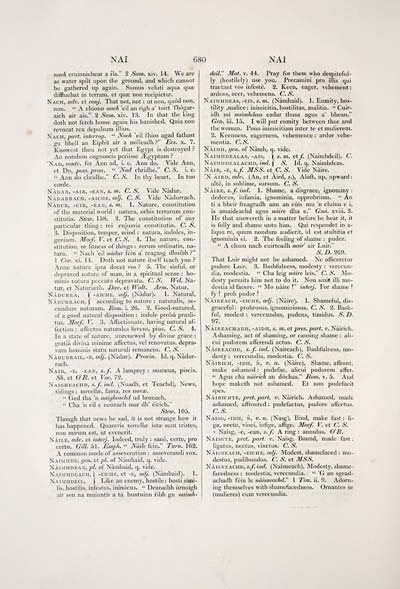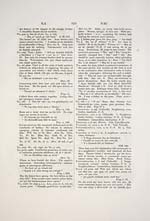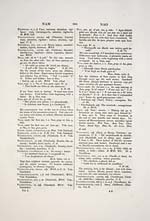Download files
Complete book:
Individual page:
Thumbnail gallery: Grid view | List view

NAI 6f
nach cruinnichear a ris." 2 Sam. xiv. 14. We are
as water spilt upon the ground, and which cannot
be gathered up again. Sumus veluti aqua quae
diffluebat in terram, et qua non recipietur.
Nacii, adv. et conj. Tliat not, not : ut non, quod non,
non. " A chionn nach 'eil an righ a' toirt 'fliògar-
aich air ais." 2 Sam. xiv. 13. In that the king
doth not fetch home again his banished. Quia non
revocat rex depulsum illius.
Nach, part, interrog. " Nach "eil fhios agad fathast
SU bheil an Eiphit air a milleadh?" Ecs. x. 7.
knowest tliou not yet that Egypt is destroyed ?
An nondum cognoscis periisse ^Egyptum ?
'Nad, contr. for Ann ad, i. e. Ann do. Vide Ann,
et Do, poss. pron. " 'Nad chridhe." C. 5. i. e.
" Ann do chridhe." C. S. In thy heart. In tuo
NÀDAR, -AIR, -EAN, s. m. C. S. Vide Nàdur.
NÀDARRACH, -AicHE, a<^'. C. S. Vide Nàdurrach.
NÀDUR, -uiR, -EAN, s. m. 1. Nature, constitution
of the material world : natura, orbis terrarum con-
stitutio. Stew. 158. 2. The constitution of any
particular tiling : rei cujusvis constitutio. C. S.
3. Disposition, temper, mind : natura, indoles, in-
genium. Macf. V. et C. S. 4. The nature, con-
stitution, or fitness of things : rerum ordinatio, na-
tura. " Nach 'eil nàdur fèin a teagasg dhuibh ?"
1 Cnr. xi. 14. Doth not nature itself teach you ?
Anne natura ipsa docet vos ? 5. The sinful, or
dL-i.ravcd r.aturu of man, in a spiritual sense : ho-
mini^ natura pcccato depravata. C. S. Wei. Na-
tur, et Naturiatli. Bar. et Wait. Arm. Natur.
NÀDURRA, I -AiCHE, adj. (Xàdur). 1. Natural,
NÀDURRACH, J according to nature : naturalis, se-
cundum naturam. Bom. i. 20. 2. Good-natured,
of a good natural disposition: indole proUà pra-di-
tus. Macf. V. 3. Affectionate, having natural af-
fection : affectus naturales fovens, plus. C. S. 4.
In a state of nature, unrenewed by divine grace :
gratia divinà minirae affectus, vel renovatus. depra-
vato hominis statu natural! remanens. C. S.
NÀDURRAIL, -E, odj. (Nàdur). Provin. Id. q. Nàdur-
Naid, -e, -EAN, s.f. A lamprey: muraena, piscis.
Sh. et OR. et Voc. 72.
Naigheachd, s.f. ind. (Nuadh, et Teachd), News,
tidings : novellae, fama, res novae.
" Ged tha 'n tiaigheachd ud bronach,
" Cha 'n eil e neònach mar dh' eirich."
Stew. 105.
Though that news be sad, it is not strange how it
has happened. Quamvis novellae istse sunt tristes,
NÀILE, adv. et interj. Indeed, truly : sane, certe, pro
certo. Gill. 51. Emph. " Nàile fein." Turn. 162.
A common mode of asseveration : asseverandi vox.
Naimiide, gen. etpl. of Nàmhaid, q. vide.
NÀIMHDEAN, />/. of Nàmhaid, q. vide.
Naimiideacii, Ì -EiCHE, et -E, adj. (Nàmhaid). 1.
Nai.mhdeil, j Like an enemy, hostile: hosti simi-
lis, hostilis, iijfestus, inimicus. " Deanaibh ùmuigh
I buntuinn fibh gu naimh-
) NAI
deil." Mat. V. 44. Pray for them who despiteful-
ly (hostilely) use you. Precamini pro illis qui
tractant vos infestè. 2. Keen, eager, vehement :
ardens, acer, vehemens. C. S.
Naimhdeas, -eis, s. m. (Nàmhaid). 1. Enmity, hos-
tility ,malice: inimicitia, hostilitas, malitia. " Cuir-
idh mi naimhdeas eadar thusa agus a' bhean."
Gen. iii. 15. I will put enmity between thee and
2. Keenness, eagerness, vehemence : ardor vehe-
NÀIMH, gen. of Nàmh, q. vide.
Naimhdealas, -ais, \ s. m. et/. (Naimhdeil). C.
Naimhdealachd, wjrf.J S. Id. q. Naimhdeas.
NÀIR, -E, s.f MSS. et C. S. Vide Nàire.
'N ÀIRD, adv. (An, et Àird, s.). Aloft, up, upward:
altè, in sublime, sursum. C. S.
NÀIRE, s.f ind. 1. Shame, a disgrace, ignominy :
dedecus, infamia, ignominia, opprobrium. " An
ti a bheir freagradh ann an cùis mu 'n cluinn e i,
is amaideachd agus nàire dha e." Gnà. xviii. 3.
He that answereth in a matter before he hear it, it
is folly and shame unto him. Qui respondet in a-
liqua re, quum nondum audierit, id est stultitia et
ignominia ei. 2. The feeling of shame : pudor.
" A chum nach cuirteadh nair air Luir."
S. D. 269.
That Luir might not be ashamed. Ne afficeretur
pudore Luir. 3. Bashfulness, modesty : verecun-
dia, modestia. " Cha ieig nàire leis." C. S. Mo-
desty permits him not to do it. Non sinit illi mo-
destia id facere. " Mo nàire !" inteij. For shame !
fy ! proh pudor !
NÀIREACH, -EICHE, odj. (Nàire). 1. Shameful, dis-
graceful : probrosus, ignorainiosus. C. S. 2. Bash-
ful, modest : verecundus, pudens, timidus. S. D.
97.
NÀIREACHADH, -AiDH, «. m. et. pres. part. jj. Nàirich.
Ashaming, act of shaming, or causing shame : ali-
cui pudorem afferendi actus. C. S.
NÀIREACHD, s.f. ind. (Naireach), Bashfulness, mo-
desty : verecundia, modestia. C. S.
NÀIRICH, -IDH, N, V. a. (Nàire), Shame, affront,
make ashamed : pudefac, alicui pudorem affer.
" Agus cha nàirich an dòchas." Rom. v. 5. And
hope maketh not ashamed. Et non pudefacit
"i^AXKicnTK, pret. part. i'. Nàirich. Ashamed, made
ashamed, affronted : pudefactus, pudore affectus.
C.S.
Naisc;, -IDH, N, V. a. (Nasg), Bind, make fast : li-
ga, necte, vinci, infige, affige. Macf V. et C. S.
• Naisg, -e, -ean, s.f. A ring: annulus. O'R.
Naisgte, pret. part. v. Naisg. Bound, made fast :
ligatus, nectus, vinctus. C. S.
NÀISNEACH, -EiCHE, adj. Modcst, shamefaced: mo-
destus, pudibundus. C. S. et 3ISS.
NÀISNEACHD, s./. iVirf. (Naisneach), Modesty, shamc-
facedness : modestia, verecundia. " 'G an sgead-
achadh fein le nàisneachd." 1 Tim. ii. 9. Adorn-
ing themselves with shamefacedness. Ornantes se
(mulieres) cum verecundia.
nach cruinnichear a ris." 2 Sam. xiv. 14. We are
as water spilt upon the ground, and which cannot
be gathered up again. Sumus veluti aqua quae
diffluebat in terram, et qua non recipietur.
Nacii, adv. et conj. Tliat not, not : ut non, quod non,
non. " A chionn nach 'eil an righ a' toirt 'fliògar-
aich air ais." 2 Sam. xiv. 13. In that the king
doth not fetch home again his banished. Quia non
revocat rex depulsum illius.
Nach, part, interrog. " Nach "eil fhios agad fathast
SU bheil an Eiphit air a milleadh?" Ecs. x. 7.
knowest tliou not yet that Egypt is destroyed ?
An nondum cognoscis periisse ^Egyptum ?
'Nad, contr. for Ann ad, i. e. Ann do. Vide Ann,
et Do, poss. pron. " 'Nad chridhe." C. 5. i. e.
" Ann do chridhe." C. S. In thy heart. In tuo
NÀDAR, -AIR, -EAN, s. m. C. S. Vide Nàdur.
NÀDARRACH, -AicHE, a<^'. C. S. Vide Nàdurrach.
NÀDUR, -uiR, -EAN, s. m. 1. Nature, constitution
of the material world : natura, orbis terrarum con-
stitutio. Stew. 158. 2. The constitution of any
particular tiling : rei cujusvis constitutio. C. S.
3. Disposition, temper, mind : natura, indoles, in-
genium. Macf. V. et C. S. 4. The nature, con-
stitution, or fitness of things : rerum ordinatio, na-
tura. " Nach 'eil nàdur fèin a teagasg dhuibh ?"
1 Cnr. xi. 14. Doth not nature itself teach you ?
Anne natura ipsa docet vos ? 5. The sinful, or
dL-i.ravcd r.aturu of man, in a spiritual sense : ho-
mini^ natura pcccato depravata. C. S. Wei. Na-
tur, et Naturiatli. Bar. et Wait. Arm. Natur.
NÀDURRA, I -AiCHE, adj. (Xàdur). 1. Natural,
NÀDURRACH, J according to nature : naturalis, se-
cundum naturam. Bom. i. 20. 2. Good-natured,
of a good natural disposition: indole proUà pra-di-
tus. Macf. V. 3. Affectionate, having natural af-
fection : affectus naturales fovens, plus. C. S. 4.
In a state of nature, unrenewed by divine grace :
gratia divinà minirae affectus, vel renovatus. depra-
vato hominis statu natural! remanens. C. S.
NÀDURRAIL, -E, odj. (Nàdur). Provin. Id. q. Nàdur-
Naid, -e, -EAN, s.f. A lamprey: muraena, piscis.
Sh. et OR. et Voc. 72.
Naigheachd, s.f. ind. (Nuadh, et Teachd), News,
tidings : novellae, fama, res novae.
" Ged tha 'n tiaigheachd ud bronach,
" Cha 'n eil e neònach mar dh' eirich."
Stew. 105.
Though that news be sad, it is not strange how it
has happened. Quamvis novellae istse sunt tristes,
NÀILE, adv. et interj. Indeed, truly : sane, certe, pro
certo. Gill. 51. Emph. " Nàile fein." Turn. 162.
A common mode of asseveration : asseverandi vox.
Naimiide, gen. etpl. of Nàmhaid, q. vide.
NÀIMHDEAN, />/. of Nàmhaid, q. vide.
Naimiideacii, Ì -EiCHE, et -E, adj. (Nàmhaid). 1.
Nai.mhdeil, j Like an enemy, hostile: hosti simi-
lis, hostilis, iijfestus, inimicus. " Deanaibh ùmuigh
I buntuinn fibh gu naimh-
) NAI
deil." Mat. V. 44. Pray for them who despiteful-
ly (hostilely) use you. Precamini pro illis qui
tractant vos infestè. 2. Keen, eager, vehement :
ardens, acer, vehemens. C. S.
Naimhdeas, -eis, s. m. (Nàmhaid). 1. Enmity, hos-
tility ,malice: inimicitia, hostilitas, malitia. " Cuir-
idh mi naimhdeas eadar thusa agus a' bhean."
Gen. iii. 15. I will put enmity between thee and
2. Keenness, eagerness, vehemence : ardor vehe-
NÀIMH, gen. of Nàmh, q. vide.
Naimhdealas, -ais, \ s. m. et/. (Naimhdeil). C.
Naimhdealachd, wjrf.J S. Id. q. Naimhdeas.
NÀIR, -E, s.f MSS. et C. S. Vide Nàire.
'N ÀIRD, adv. (An, et Àird, s.). Aloft, up, upward:
altè, in sublime, sursum. C. S.
NÀIRE, s.f ind. 1. Shame, a disgrace, ignominy :
dedecus, infamia, ignominia, opprobrium. " An
ti a bheir freagradh ann an cùis mu 'n cluinn e i,
is amaideachd agus nàire dha e." Gnà. xviii. 3.
He that answereth in a matter before he hear it, it
is folly and shame unto him. Qui respondet in a-
liqua re, quum nondum audierit, id est stultitia et
ignominia ei. 2. The feeling of shame : pudor.
" A chum nach cuirteadh nair air Luir."
S. D. 269.
That Luir might not be ashamed. Ne afficeretur
pudore Luir. 3. Bashfulness, modesty : verecun-
dia, modestia. " Cha ieig nàire leis." C. S. Mo-
desty permits him not to do it. Non sinit illi mo-
destia id facere. " Mo nàire !" inteij. For shame !
fy ! proh pudor !
NÀIREACH, -EICHE, odj. (Nàire). 1. Shameful, dis-
graceful : probrosus, ignorainiosus. C. S. 2. Bash-
ful, modest : verecundus, pudens, timidus. S. D.
97.
NÀIREACHADH, -AiDH, «. m. et. pres. part. jj. Nàirich.
Ashaming, act of shaming, or causing shame : ali-
cui pudorem afferendi actus. C. S.
NÀIREACHD, s.f. ind. (Naireach), Bashfulness, mo-
desty : verecundia, modestia. C. S.
NÀIRICH, -IDH, N, V. a. (Nàire), Shame, affront,
make ashamed : pudefac, alicui pudorem affer.
" Agus cha nàirich an dòchas." Rom. v. 5. And
hope maketh not ashamed. Et non pudefacit
"i^AXKicnTK, pret. part. i'. Nàirich. Ashamed, made
ashamed, affronted : pudefactus, pudore affectus.
C.S.
Naisc;, -IDH, N, V. a. (Nasg), Bind, make fast : li-
ga, necte, vinci, infige, affige. Macf V. et C. S.
• Naisg, -e, -ean, s.f. A ring: annulus. O'R.
Naisgte, pret. part. v. Naisg. Bound, made fast :
ligatus, nectus, vinctus. C. S.
NÀISNEACH, -EiCHE, adj. Modcst, shamefaced: mo-
destus, pudibundus. C. S. et 3ISS.
NÀISNEACHD, s./. iVirf. (Naisneach), Modesty, shamc-
facedness : modestia, verecundia. " 'G an sgead-
achadh fein le nàisneachd." 1 Tim. ii. 9. Adorn-
ing themselves with shamefacedness. Ornantes se
(mulieres) cum verecundia.
Set display mode to: Large image | Transcription
Images and transcriptions on this page, including medium image downloads, may be used under the Creative Commons Attribution 4.0 International Licence unless otherwise stated. ![]()
| Early Gaelic Book Collections > Blair Collection > Dictionarium scoto-celticum > Volume I > (750) |
|---|
| Permanent URL | https://digital.nls.uk/76583827 |
|---|
| Description | Lacks half title page in Volume 1. |
|---|---|
| Attribution and copyright: |
|
| Description | A selection of books from a collection of more than 500 titles, mostly on religious and literary topics. Also includes some material dealing with other Celtic languages and societies. Collection created towards the end of the 19th century by Lady Evelyn Stewart Murray. |
|---|
| Description | Selected items from five 'Special and Named Printed Collections'. Includes books in Gaelic and other Celtic languages, works about the Gaels, their languages, literature, culture and history. |
|---|

